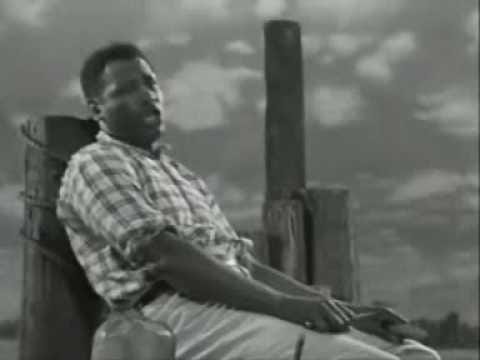In celebration of the two-year anniversary of Word & Song on the Fourth of July, we are offering a special rate on paid, gift, and upgraded subscriptions. Check your inboxes through this July for more!
Sometimes a Song is a delight and even an honor to present. Today’s song is just one of those. As I began to write this week’s entry, I put a recording of the song on to inspire myself — but I wrote absolutely not one word while listening to it, because the music is too compelling, and all I could do was soak it in.
It would take a music historian with a specialty in Broadway shows to do justice to the composer of our song, “Ol’ Man River,” from the musical, “Showboat.” And I am not speaking now of the immensely talented librettist and lyricist, Oscar Hammerstein, whose later work with Richard Rodgers is legendary, but of the utterly innovative music-maker, Jerome Kern. In a career of that spanned the first half of the 20th century, Kern composed over 700 songs, all but one of those for musicals, most of them on Broadway, with a brief stint on London’s West End and, very late in his career, in Hollywood. But Jerome Kern’s heart was forever in Broadway, and why not? He is widely considered “the father of the American musical theater. Is that title deserved? I think so.
I’ve observed before here that the 1920’s was a period of transition in American musical theater from the Vaudeville era to the era of great musical plays. Arguably, “Show Boat” was the first of these, and it made way for the flourishing to come. Taught to play the piano by his mother, Jerome Kern was already working on musical shows in high school at the turn of the century. He attended the New York College of Music, after which he went to Heidelberg for advanced studies in composition and harmonization. When he returned to New York, he supported himself in the manner of many of the rising generation of popular composers — as a tune plugger for Tin Pan Alley publishers and as a rehearsal pianist for Broadway shows. He was also honing his skill by composing scores for the silent movies.
From 1905 to about 1910, Kern was spending much of his time across the pond, where he had accepted a contract to customize London theatrical productions for American audiences. This work gave him an apprenticeship in the writing of show tunes, which he was soon contributing to productions for the London stage, as well. That is where he met a lyricist named P. G. Wodehouse (known to most of us for his work as a humorist) and a librettist named Guy Bolton. And by the late 19-teens the show-writing trio of Bolton, Wodehouse, and Kern were together in the US, taking Broadway by storm, turning out Gilbert and Sullivan inspired integrated comedic musical plays at break-neck speed for a relatively small venue with only 299 seats, The Princess Theater. These shows were so popular that patrons had to book tickets many months in advance, and some of them had long runs.
All things have an end, and by the turn of the decade, Kern began to work with a series of lyricists to produce play after play after successful play during each year of the 1920’s, often in show which overlapped with each other. He was in such demand by then that he reportedly at one time had contributed songs to 19 different simultaneously running plays on Broadway. And if all of this were not enough to justify his designation as “the father of the American Musical,” the nature of his music itself was changing the literal tempo on Broadway.
Kern had a knack for adding distinctly American musical elements to his songs — Ragtime, jazz, syncopation. And that may be why as soon as he read Edna Ferber’s hit novel, Showboat, he determined to turn it into a musical play. He had been trying for a long time to integrate the story and the music more fully, rather than following the old style of stringing the songs together with a minimal plot. And Kern saw that the setting of the novel itself was perfect for adaptation to the Broadway stage. What is better than a show about a showboat full of entertainers? Having enlisted the remarkable talent of Oscar Hammerstein for the book and the lyrics, and with a great string of successes in his resume, Kern managed to persuade the greatest showman on of the day, Florenz Ziegfeld, himself, to come aboard with the project. Ziegfeld had some doubts about how story of the novel would go over with his audience. And I have even heard that he wanted Jerome Kern to take “Old Man River” out of the score. Fortunately for everyone, Ziegfeld put his greatest effort, not to mention a lot of money, into making the show spectacular. And he left the music and the book to Kern and Hammerstein.
On opening night there did seem to be cause for concern. The audience were slow to arrive and took their seats silently. And because the form of the play was so different from the usual Ziegfeld productions, the cast took no curtain calls, as they would usually have done. When the curtain dropped, there was quiet and polite applause only. There were no calls for encores. And the patrons filed out as quietly as they had arrived. It was only the next morning when the rave reviews came in and the box-office was flooded with ticket requests that everyone breathed a sigh of relief. The new style of Broadway show had worked! People loved it. Perhaps they were quiet because they were so overwhelmed by it. “Showboat” opened at the Ziegfeld Theater on December 27, 1927 and ran for 572 days, a fabulous run. From New York it went on to become a great hit on London’s West End, and from there it toured the world.
Not only was “Showboat” a great success for Jerome Kern, but it was Florenz Ziegfeld’s greatest production ever, rather a capstone for his career. And that was good for him, because the dark cloud of the stock market crash was just around the corner, and world-wide depression was looming. Ziegfeld lost his entire fortune in the crash. And of those earliest Broadway shows, “Showboat” is the only one which has enjoyed revivals consistently to our own day — almost 100 years later.
As for our song, if you love it, there’s a reason for that. “Ol’ Man River” is a musical masterpiece composed in a pentatonic scale (five notes per octave), and the tune is an inversion of the opening number, “Cotton Blossom.” Kern and Hammerstein needed a tune to finish out the play’s first scene, and Oscar suggested that Jerome just invert the notes sung to “Cotton Blossom,” but to slow the tune down and make it kind of mournful. The result was “Ol’ Man River,” a song for the ages. In the play the song is sung four times and integrates the unchanging steadiness of nature (the river, personified) with the story of turmoil, hardships, and human suffering. It fills the place of the chorus in a Greek play, reminding the audience that there is more to the story than what they are told by the actors, and that, there is order in the natural world which transcends our human struggles.
I mentioned that there have been many remakes of “Showboat,” both on stage and on film. But one version of our song for this week is considered the gold standard performance of “Ol’ Man River.” That is the version below, performed by Paul Robeson, a fine singer and an actor with an international reputation, known for his portrayal of Othello and for many other roles in legitimate theater. His voice is characterized as bass-baritone, and his performance of “Ol’ Man River” is a masterpiece in itself. Robeson played the part of Joe when the show traveled to London, where he was already a popular actor and singer. The clip below is from the first film version of “Showboat,” released in 1936.





“You and me, we sweat and strain,…” perfectly dovetails with the current Word of the Week. William Warfield’s interpretation is also magnificent in MGM’s technicolor version of “Showboat” from 1951.
Thank you for this! Y’all might like this recent Hillsdale talk by Mark Steyn on the history of broadway, featuring a lot of Kern:
https://freedomlibrary.hillsdale.edu/programs/cca-iv-the-american-musical/american-musicals-and-the-great-american-songbook?utm_campaign=ea_15min&utm_medium=youtube&utm_source=youtube&utm_content=Steyn